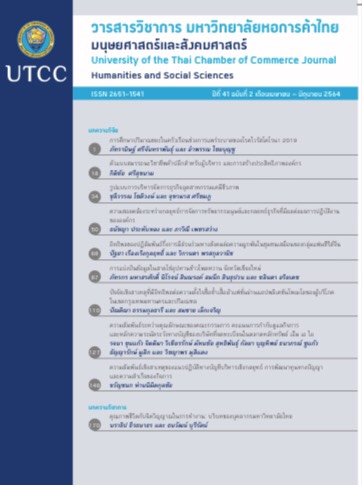The relationship between Board Characteristics, Corporate Governance Score (CG Score) and Accounting Conservatism of Listed Companies in the Market for Alternative Investment (MAI)
Main Article Content
Abstract
This study aims to investigate the relationship among Board characteristics, CG Score and Accounting Conservatism by collecting data from the annual report of 320 listed companies in the Market for Alternative Investment (MAI) during the period of 2016 – 2019. In this study indicators of Board Characteristics are size of committee, Board independent, finance and accounting knowledge, dual position, foreigner committee and committee gender. For CG Score, the study uses CG score from the annual report. Additionally, in the main variable accounting caution, this study employs executive judgment in the calculation of Modified Jones Model to measure the Accounting Conservatism. The results demonstrate there is no significant association between Board Characteristics and Accounting Conservatism. In contrast, the findings reveal a positive association between CG Score and Accounting Conservatism. The results are benefit to the business and that can apply the principles of good corporate governance to increase the efficiency of Accounting Conservatism, moreover, the findings are useful for stakeholders to make decision.
Article Details

This work is licensed under a Creative Commons Attribution-NonCommercial-NoDerivatives 4.0 International License.
ลิขสิทธิ์ของบทความ
ผลงานที่ได้รับการตีพิมพ์ถือเป็นลิขสิทธิ์ของมหาวิทยาลัยหอการค้าไทย ห้ามมิให้นำเนื้อหา ทัศนะ หรือข้อคิดเห็นใด ๆ ของผลงานไปทำซ้ำ ดัดแปลง หรือเผยแพร่ ไม่ว่าทั้งหมดหรือบางส่วนโดยไม่ได้รับอนุญาตเป็นลายลักษณ์อักษรจากมหาวิทยาลัยหอการค้าไทยก่อน
References
เกรียงไกร บุญเลิศอุทัย, และอนุวัฒน์ ภักดี. (2561). คุณลักษณะของคณะกรรมการ ความระมัดระวังทางบัญชีและผลการดําเนินงานของบริษัทจดทะเบียนในตลาดหลักทรัพย์แห่งประเทศไทย. วารสารวิชาชีพบัญชี, 14(43), 27-47.
ณัฐนพร สุพิชยา, วศินี ธรรมศิริ, กฤติยา ดาบเพชร, และฐิติพร สงวนพันธุ. (2561). สัดส่วนของคณะกรรมการต่างชาติกับผลการดำเนินงานของบริษัทจดทะเบียนในตลาดหลักทรัพย์แห่งประเทศไทย กลุ่ม SET100. ใน การประชุมวิชาการและนำเสนอผลงานวิชาการระดับชาติ UTCC Academic Day ครั้งที่2 (น. 616-630). กรุงเทพฯ: มหาวิทยาลัยหอการค้าไทย.
ธัญญ์นรี แซ่โง้ว. (2557). ความสัมพันธ์ระหว่างค่าตอบแทนคณะกรรมการบริษัทและสัดส่วนผู้บริหารหญิงกับผลตอบแทนของผู้ถือหุ้นของบริษัทที่จดทะเบียนในตลาดหลักทรัพย์แห่งประเทศไทยกลุ่ม SET100 (การค้นคว้าอิสระมหาบัณฑิต ไม่ได้ตีพิมพ์). มหาวิทยาลัยกรุงเทพ, กรุงเทพฯ.
บรรดาศักดิ์ ชูสาย, และกนกศักดิ์ สุขวัฒนาสินิทธ์. (2562). ปัจจัยที่มีอิทธิพลต่อคุณภาพรายงานตรวจสอบภายในของบริษัทจดทะเบียนในตลาดแห่งประเทศไทย. วารสารมนุษยศาสตร์และสังคมศาสตร์ มหาวิทยาลัยราชภัฏอุดรธานี, 8(1), 19-34.
ลัดดาวัลย์ พุดขุนทด, และชุติมา นาคประสิทธิ์. (2561). ความสัมพันธ์ระหว่างคุณลักษณะของคณะกรรมการบริษัทกับผลการดําเนินงานทางด้านบัญชี. วารสาร มทร.อีสาน ฉบับมนุษยศาสตร์และสังคมศาสตร์, 5(1), 18-31.
Affes, H., & Sardouk, H. (2016). Accounting conservatism and corporate performance: The moderating effect of the board of directors. Journal of Business & Financial Affairs, 5(2), 1-8.
Ahmed, K., & Henry, D. (2012). Accounting conservatism and voluntary corporate governancemechanisms by Australian firms. Accounting and Finance, 52, 631-662.
Almutair, A. R., & Quttainah, M. A. (2019). Corporate governance and accountingconservatism in Islamic banks. WILEY, 61(5), 745-764.
Al-Sraheen, A. O., Fadzil, F. H., & Ismail, S. (2014a). Does corporate governance matter? evidence from accounting conservatism practices among Jordanian listed companies. International Journal of Learning & Development, 4(4), 64-80.
Al-Sraheen, A. O., Fadzil, F. H., & Ismail, S. (2014b). The Influence of corporate ownership structure and board members’ skills on the accounting conservatism: Evidence from non-financial listed firms in Amman stock exchange. International Journal of Accounting and Financial Reporting, 4(1), 177-201.
Chi, W., Liu, C., & Wang, T. (2007). What affects accounting conservatism: A corporate governance perspective. Journal of Contemporary Accounting & Economics, 5(1), 47-59.
Choi, H. J. , & Yoon, J. (2006). The effects of corporate governance on conservativeness of accounting information. Korean Accounting Review, 31, 145-174.
Dechow, P. M., Sloan, R. G., & Sweeney, A. P. (1995). Detecting earnings management. The Accounting Review, 70(2), 193-225.
El-habashy, H. A. (2019). The effect of corporate governance attributes on accounting
conservatism in Egypt. Academy of Accounting and Financial Studies Journal, 23(3), 1-18. Enache, L., & Garc´ıa-Meca, E. (2019). Board composition and accounting conservatism: The role of business experts, support specialist and community influentials. Australian Accounting Review, 29(88), 252-265.
Garcı ´a Lara, J. M., Garcı ´a Osma, B., & Penalva, F. (2007). Board of directors’ characteristics and conditional accounting conservatism. European Accounting Review, 16(4), 727-755.
Garcı ´a Lara, J. M., Garcı ´a Osma, B., & Penalva, F. (2009). Accounting conservatism and corporate governance. Springer Science+Business Media, 14, 161-201.
Jaimuk, P., Nilapornkul, N., & Ngudgratoke, S. (2020). Good governance and accounting conservatism: Evidence Thai listed companies. International Journal of Applied Computer Technology and Information Systems, 9(2), 24-28.
Jensen, M. C., & Meckling, W. H. (1976). Theory of the firm: Managerial behavior, agency costs and ownership structure. Journal of Financial Economics, 3(4), 305-360.
Khalilov, A., & Osma, B. G. (2020). Accounting conservatism and the profitability of corporate insiders. Journal of Business Finance and Accounting, 47, 333-364.
Makhlouf, M. H., AI-Sufyn, F. J., & Almubaideen, H. (2018). Board diversity and accounting conservatism: Evidence from Jordan. International Business Research, 11(7), 130-141.
Oludele, O. I., Oloko, M. A., & Tobiah, O. (2016). The relationship between board independence and financial performance of listed manufacturing companies in Nigeria. European Journal of Business, Economics and Accountancy, 4(9), 45-56.
Rani, N., Yadava, S. S., & Jaina, P. K. (2013). Impact of corporate governance score on abnormal returns of mergers and acquisitions. Procedia Economics and Finance, 5, 637 – 646
Saeed, M. B., & Saeed, S. K. (2018). Corporate governance and accounting conservatism:moderating role of audit quality and disclosure quality. Business & Economic Review,10(2), 123-150.
The Stock Exchange of Thailand. (2017). Corporate governance code for listed companies 2017. Retrieved from file:///C:/Users/OCS/Downloads/Thai%20cgcode%20EN.pdf
Sultana, N. (2015). Audit committee characteristics and accounting conservatism. International
Journal of Auditing, 19(2), 88-102.
Utami, W., & Pernamasari, R. (2019). Study on ASEAN listed companies: Corporate governance and firm performance. International Journal of Business, Economics and Law, 19(5), 181-188
Yasa, G. W., Astika, I. P., & Widiariani, N. A. (2019). The Influence of accounting conservatism, Ios, and good corporate governance on the earning quality. Jurnal Ilmiah Akuntansi dan Bisnis, 14(1), 86-94
Yilmaz, I. (2018). Corporate governance and financial performance relationship: Case for Oman companies. Journal of Accounting, Finance and Auditing Studies, 4(4), 84-106.
Yunos, M., Ahmad, S. A., & Sulaiman, N. (2014). The influence of internal governancemechanisms on accounting conservatism. Elsevier, 164, 501-507.


